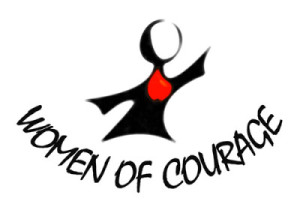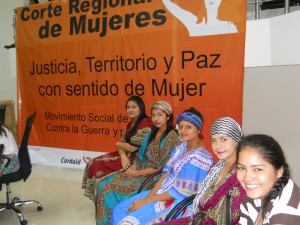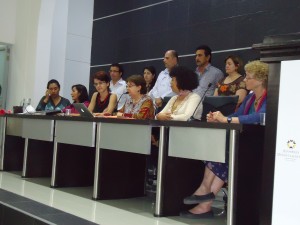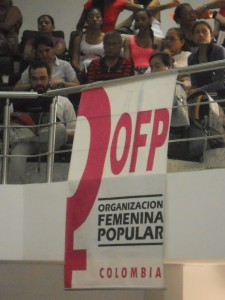The Regional Women’s Court in Bucaramanga

On November 25, the International Day to End Violence against Women, I had the privilege of participating in the regional Women`s Courts for Justice, Territory and Reparation in Bucaramanga, Colombia. KAIROS was invited to be a part of a symbolic jury that included senators, municipal councillors, academics, church representatives, human rights defenders, and international partners. The process was accompanied by the UN office in Colombia.
The Court took place in the Assembly of the Departmental Government building of Santander in Bucaramanga, the regional seat of power. The OFP and other members of the Movement of Women against the War and for Peace quickly took over the space and made it their own with candles, flowers, banners and music. For the women from the communities of Santander and Magdalena Medio, and the victims who came to give their testimonies, this was a rare opportunity to raise awareness of violence and human rights violations against women in Colombia, and to seek justice, reparations and peace from the perspective of women (con sentido de mujer). These courts are part of the OFP’s strategy to create and reclaim democratic and political space.
The Court heard testimonies from 16 women who are victims of different forms of gender violence, including sexual violence, sociopolitical and economic violence, femicide, and cultural violence. The cases were all documented by OFP, and are considered representative of the different forms of gender violence. Each area was contextualized by expert witnesses. The audience was made up of about 150 people, mostly women, from the same communities.The Court was harrowing. Words fail to appropriately describe the experience, but they are all I have to work with. We heard heart-breaking testimonies of unimaginable violence against women in the context of the armed conflict, as well as in the context of societal and systematic violence against women in Colombia. One woman said she had been raped repeatedly since the age of ten by family members and members of the armed forces. She started her testimony by saying that her case was one of thousands. When asked by the jury what she was demanding in terms of reparations, she looked up and said – reparation for what? (reparaciones para que?). She didn’t need to say anymore. Somehow the idea of reparations seemed so utterly inadequate in the face of what she had been through. Even according to the official statistics sexual violence against women has increased in recent years and there is almost absolute impunity (97%) surrounding these cases.
We heard cases of femicide – the most extreme case of violence against women. We heard testimonies from family members about sisters, mothers and daughters who had been killed simply for being women. So often these murders are dismissed by the police and other authorities as crimes of passion. In fact, one of the recommendations that came out of the court was that femicide be recognized in law as a distinct crime.
In the area of social political violence, the case of the Organizacion Femenina Popular (OFP) was presented as an example of the systematic violence against women’s organizations and movements. In 2000, when the paramilitary took over Barrancabermeja, the OFP became a target because they resisted the violence, repression and totalitarianism of the paramilitary and offered a refuge and alternative to women and their families. The OFP has documented 138 human rights violations against the organization since that time, including the assassination of three of their leaders. The persecution, threats and victimization of the leaders and members was described as a paramilitary project to exterminate the organization and a crime against humanity. The OFP is demanding collective reparations for the organization and individual reparations for members of the OFP who have been victimized.
In the area of economic violence we heard testimonies that clearly demonstrated how large scale development projects impact the lives of women, especially when these projects affect ancestral land and the environment. These projects included mining, African palm plantations and hydroelectric dams. The impact from these projects is exacerbated by the conflict or, as was described in some cases, is an extension or continuation of the conflict. A fisherwoman described how her family and community had lived through guerrilla control and then paramilitary occupation and how she had lost a son during those years. Today, the Hydrosogamoso hydroelectric dam has moved in, displacing people, causing social unrest and violence and taking away their livelihood because they can no longer fish.
After hearing the testimonies and expert witnesses, the jury was asked to render an ethical verdict based on both legal knowledge (we had a number of excellent lawyers in our midst)and ethical principles. We felt an enormous responsibility to reflect the testimonies we had heard. It was clear that all forms of violence are cross cutting. We wanted to address the violence against women in conflict as well as the systemic violence against women in society, and, therefore, the need not only to end the conflict but to transform society so that violence against women is not tolerated. We wanted to reflect the ongoing impunity, the victimization and re-victimization of women. We needed to express to urgency of the situation to the Colombian State and the International community. Finally, we wanted to assure the women who gave their testimonies that there would be ongoing accompaniment. In the end, we developed and delivered an ethical verdict which, although symbolic, we hope will be used to seek real justice. A translation of this verdict will be posted shortly.
The proceedings, testimonies and ethical verdict from this first and subsequent regional courts will inform the National Women’s Court which is scheduled for the end of November 2013. It is extremely important that these courts are seen not as distinct events but as part of a process towards truth, justice, restitution and peace for women in Colombia. The process aims to end all forms of violence against women, including violence that is part of the armed conflict and the systemic, societal and cultural violence that continues to exist and is exacerbated by the conflict. The proposal and challenge from these women courts is difficult and long term–to end conflict, build genuine peace with the participation of women, and to transform society so that violence against women in all forms is not tolerated.











